Dear Kula Diaries,
Today I bring to you, the most harrowing tales that I have from my time as a park ranger: stories about toilets.
This week’s Trail Register prompt is, ‘Backcountry Toilets’ — and I thought that it was important for me to pave the way into this discussion by sharing some of my own stories and experiences during my 7.5 years as a Park Ranger.
I graduated the Park Ranger Law Enforcement Academy in 2005, and I was officially commissioned a Park Ranger with Washington State Parks in October of that same year.

The day that I was commissioned as a park ranger was one of the proudest days of my life. It had taken nearly a year to attend a law enforcement academy and re-locate my entire life from Maryland to Washington State. I had endured psychological and physical testing and finally I was hired as a Park Ranger 1 at Twanoh State Park, on the Hood Canal. I still remember walking through downtown Olympia on the day that I got commissioned. It was about 20 degrees that day, but I kept my jacket open so that anybody who passed me could see the metallic glint of my little park ranger badge. After more than a decade of serving as a volunteer for the National Park Service, I was so proud to become a Park Ranger.
When you become a Park Ranger — you have a lot of ideas about what that means. In particular, I imagined having glorious, outdoor moments — wind blowing my perfectly tousled hair as I surveyed the pristine park environment while wearing my campaign hat proudly. I imagined becoming a fixture in the community — serving the public and saving lives and protecting the park resources that couldn’t protect themselves. Yes, I imagined all of these things — but what did I spend most of my time doing?
Cleaning bathrooms. Unplugging toilets. Scooping up or spraying down human feces. Pumping septic.
It. Was. Glamorous.
In the course of my 7.5 years as a Park Ranger, I saw some of the most unthinkable bathroom catastrophes — some are so ludicrous, that I often felt like I was living in a fiction. For instance — it can’t possibly be real life to walk into a bathroom and to discover that somebody has written — in 3ft tall letters — the words ‘TREE PIG’ on the wall… in their own feces? I mean… that can’t be real, can it? I still remember entering the bathroom that day and then dragging my feet in a dramatically glum manner to the ‘pipe chase’ — the place where we stored all of our cleaning supplies. I donned my protective cleaning apparel and then went back into the bathroom and sprayed it down with a potent bleach solution. I still vividly remember scrubbing the walls with a brush — that I would be throwing away almost immediately after using it — and thinking to myself, I’m wearing gloves and protective gear to clean this up…. but the person that wrote this on the wall… did it with their bare hands!
On one of my first days at work, my boss sagely told me, “Going into a park bathroom is like receiving a present — you never know what you’re going to get!” And he was right. Some days, I’d find miniature alcohol bottles stuffed into toilets — which required me to singlehandedly remove the toilet from the floor to unplug the clog. Other times, I’d discover — much to my surprise — that somebody had decided to poop in a sink or a urinal — instead of in the toilet. On other occasions, the ‘serial pooper’ (as we lovingly called this individual) would projectile poop all over the exact same toilet and wall in the boat launch bathroom. It happened weekly, as if on cue — and we could never figure out who was doing it. Once, I tried to imagine how this was even possible — I gathered my summer temporary employees and I positioned myself, like a forensic analyst, over the toilet (while clothed, mind you) and looked at a sight line under my butt and back towards the wall. The park aides and I were stumped, “I just don’t get the angle that this person needs to tilt their butt to in order to get this type of a trajectory… and to hit that high on the wall so consistently.” The park aides shook their heads, “It’s remarkable”, they mused, “I wonder if they do it like this at home too.”
At Twanoh State Park, we had a group camp that was located up a steep, gravel road — away from the rest of the park. There was no plumbing or electricity at the group camp, but there was a vault toilet — just a hole in the ground, that had to be pumped out at least once per year. It was my responsibility to monitor the level of the septic tank underneath the vault toilet, and when it looked like it was getting dangerously close to cresting the bottom of the toilet chute itself, it was time to call for a pump out. The septic company arrived one day, and I drove our tiny little Gator vehicle up to the top of the hill to meet them and to assist.
Now, I want to preface this story by saying that I have a very strong stomach. I have worked in a trauma unit, where I have spent countless hours cleaning up human poop and pee and blood. I have also spent countless days of my life mopping up projectile poop situations in park bathrooms — so, one would think, that pumping a septic tank from a vault toilet wouldn’t phase me. Well, that’s what I thought too.
Until the sweater incident.
The man from the septic company unscrewed the hatch from the tank, and took his hose and started pumping the seemingly infinite amount of human poop and pee from inside of this vault toilet. The smell in the air was… pungent, at best, but I was a champ at holding my nose without needing to use my hands. Still, this was the type of smell that was so ripe… you could almost taste it. The man from the septic company seemed completely unphased… and he continued to lower the tube deeper and deeper into the dark abyss. Suddenly, there was a strange noise from the pump and the hose jerked around violently. Instinctually, I did what any normal person would do — and I ran away. Peering out from behind a bush, I watched as the man tamed this septic serpent as it writhed in his arms. He frantically turned off the pump and I saw him breathe a sigh of relief. Working methodically, he grabbed some tools and began to unclamp two of the sections of hose, “Got a clog”, he shouted towards me as I started to venture a bit closer to the toilet again.
He pulled apart the two sections of hose, and then — to my absolute and utter amazement, shock and horror — he reached into one side of the tube with his bare hands. Arrrrgggggggggggggggggghhhhhh, he grunted as he forcefully and slowly began to pull out the obstruction… which, I quickly identified as a dark blue sweater. The first few inches of the sweater emerged from the tube and the man grasped onto the sweater with his bare hands, and I watched as septic pulp oozed out of the poop-soaked sweater and out of the spaces between his fingers. He intensified his pulling as I stood watching — completely motionless and silent with my jaw gaping open. I didn’t know what to say. In fact, there was nothing that could be said — it was, without a doubt, one of the most horrifying things I’ve ever witnessed. Suddenly, in a flurry, the suction on the sweater was broken, and it came flinging out of the tube, followed by a delicate mist of poop and pee and whatever else had been living in that tank for the past year. The man wiped his hands on his jeans, reassembled the tube, and got back to pumping without saying a word. There was no hand sanitizer. No dipping of his hands in a pure bleach solution. No cutting off his own hands with a dull knife and discarding of them forever. Not even a simple rinse with water. That night, I took 6 showers. It still didn’t feel like enough.
A few months after the sweater incident, my boss told me that it was time to pump out our marine septic station. Twanoh State Park was constructed long before some of the current septic system requirements were in place, and somebody had designed an off shore septic tank for boats to use to offload their waste. For the record, over a decade ago, the park decommissioned and removed the the tank that I refer to in this story, and they installed a brand new — state of the art — marine pump out station in a completely different location. The Hood Canal has, very sadly, had issues with many of the archaic septic systems leaking into the water, and State Parks did receive money to completely replace the septic system at Twanoh and to install a new marine pump out station.

When I was a ranger, unfortunately for me, the old marine pump out station was still in use, which meant that I would be the one responsible for pumping it. “It’s 200 feet offshore,” I explained to my boss, “How am I supposed to pump that?”. He smiled at me and gave me the type of look that says, “Lucky you… you’re about to find out.” He instructed me to launch the park boat and to wait for further instructions. I sat in the boat and waited as a septic truck arrived in the boat launch area. My boss proceeded to retrieve hundreds of feet of septic tubing — the joints on the hose had been reinforced with a thick layer of duct tape. He then handed me a rope that was attached to one end of the septic line, and instructed me to very slowly maneuver the boat out to the pump out station while simultaneously dragging hundreds of feet of septic line behind me. With my park aide holding onto the septic line for dear life, I slowly motored the boat out to the pump out station, where we were instructed to remove the hatch from the septic tank. With our radios, we let the folks on shore know that we were ready, and the septic truck driver turned on the pump.
What happened next is something out of park ranger lore — a task that I am embarrassed to have been complicit in… a remnant ‘procedure’ that had probably been developed in the 1970s by somebody who said things like, ‘this sounds like a good idea’. Let me reiterate that pumping 900 gallons of raw sewage through a 200ft long duct-tape reinforced septic tubing that is tethered to a member of the seasonal park staff by a piece of frayed twine is never a good idea. And it is a decidedly worse idea when the aforementioned septic tubing is floating in the Hood Canal and attached to a septic truck that has backed all the way down the boat launch on shore. Very quickly, among other obvious flaws with this method, I noticed the biggest problem: when you fill 200ft of floating septic tubing up with 200ft of raw sewage, it no longer floats. Almost immediately, my park aide was straining as he attempted to prevent the septic line from pulling him off the floating pump out station. On shore, my boss was yelling motivational phrases such as, “SUCK AIR!!!! SUCK AIR!!!!”. Quickly, I took the end of the septic tubing out of the tank and I watched as the 200 feet of tubing floated back to the surface of the water — rippling like a sea monster, except one that was made of plastic and sewage.
The ‘procedure’ went like this for nearly an hour — my park aide and I learning the rhythm of this process — we’d dip the tube into the tank until it started to sink, and then I’d pull the tube out of the tank again to let it fill with air so that it would float back to the surface. Finally, and mercifully, we made it to the bottom of the tank… with nary a toxic spill. Feeling accomplished for having completed the seemingly impossible and ludicrous task of pumping out a floating pump out station, I motored the boat back to shore to return the 200 ft of septic line. “That wasn’t so bad, now was it?”, my boss said cheerfully. I shook my head. My hair was gently and perfectly tousled in the wind for a moment, and I looked around me at the Hood Canal — the Olympic Mountains rising up in the distance, and the blue sky in every single direction. I handed back the duct-taped septic line, “I guess it wasn’t”, I said. I backed the boat away from the dock and accelerated into the breeze, the salt water spray hitting my face on a perfect summer day.
Over the years that I worked at the park, I learned that it was possible to clean up anything. It was possible to clean up absolute filth and sludge — and to still find a sense of joy in what I was doing. I never ever felt like I was ‘above’ cleaning up a mess, and I never felt like I had been let down or misled about my job. As it turns out, the most difficult thing to remove from the park was me. I was a Park Ranger for over 7.5 years before I was laid off in 2012. Receiving the letter of my layoff notification was one of the most sad days of my life — never once did I regret a moment that was spent cleaning up after even the worst of messes. In fact, as I reflect on those moments now — I feel a strange sense of pride in knowing that I did what I could to make the park a better and safer place.

On my very last day at work, I published a writing piece on a personal blog that I wrote at that time, and this was the final paragraph of that piece:
As I glance at my badge, I am struck by how much meaning such a small object can have. When I first received my commission, I read that an officer wears a badge over the heart to symbolize the pledge that he or she has made. When I was commissioned as a ranger, I swore to my oath of office with a full heart. I realize now that my badge has also left an impression of its own - when it comes time to turn it in, I will hand over merely a piece of metal attached to a pin : the true meaning of the badge and the memories of my life as a park ranger are mine to keep - locked in my heart forever.
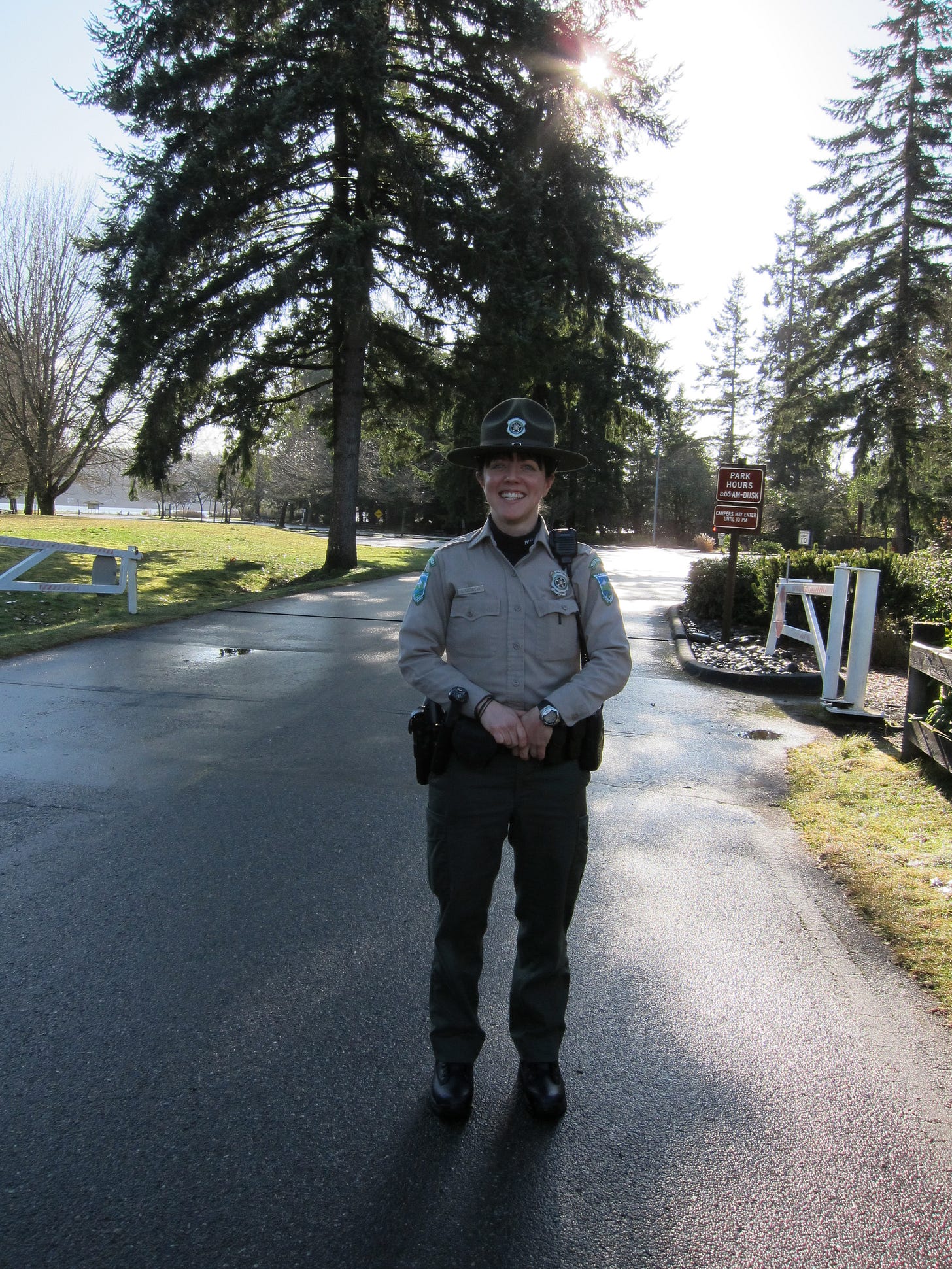
I had no idea what the next adventure would hold — and I never could have imagined that leaving my job as a Park Ranger who cleaned up toilets for a living would find me back… less than two decades later… starting a pee cloth company to clean up toilet paper in the backcountry. But, perhaps it makes sense. Perhaps the mark on my heart from being a park ranger was bigger than I ever imagined it could be. On my last day, I signed out of service with the Washington State Patrol Dispatch for the final time, and it sounded like this:
Me: Parks 402, Shelton
Dispatch: Shelton, Parks 402
Me: Parks 402… Out of Service… and thank you.
Friends — thank you all so much for being here and for reading my stories. This was particularly special to be able to share some ridiculous reflections about my time as a park ranger. Those were a special 7.5 years for me, and I have a lot of untold stories about the things that I saw and experienced. I hope I can continue to share those stories with all of you.
Sending you all so much love today and all days!




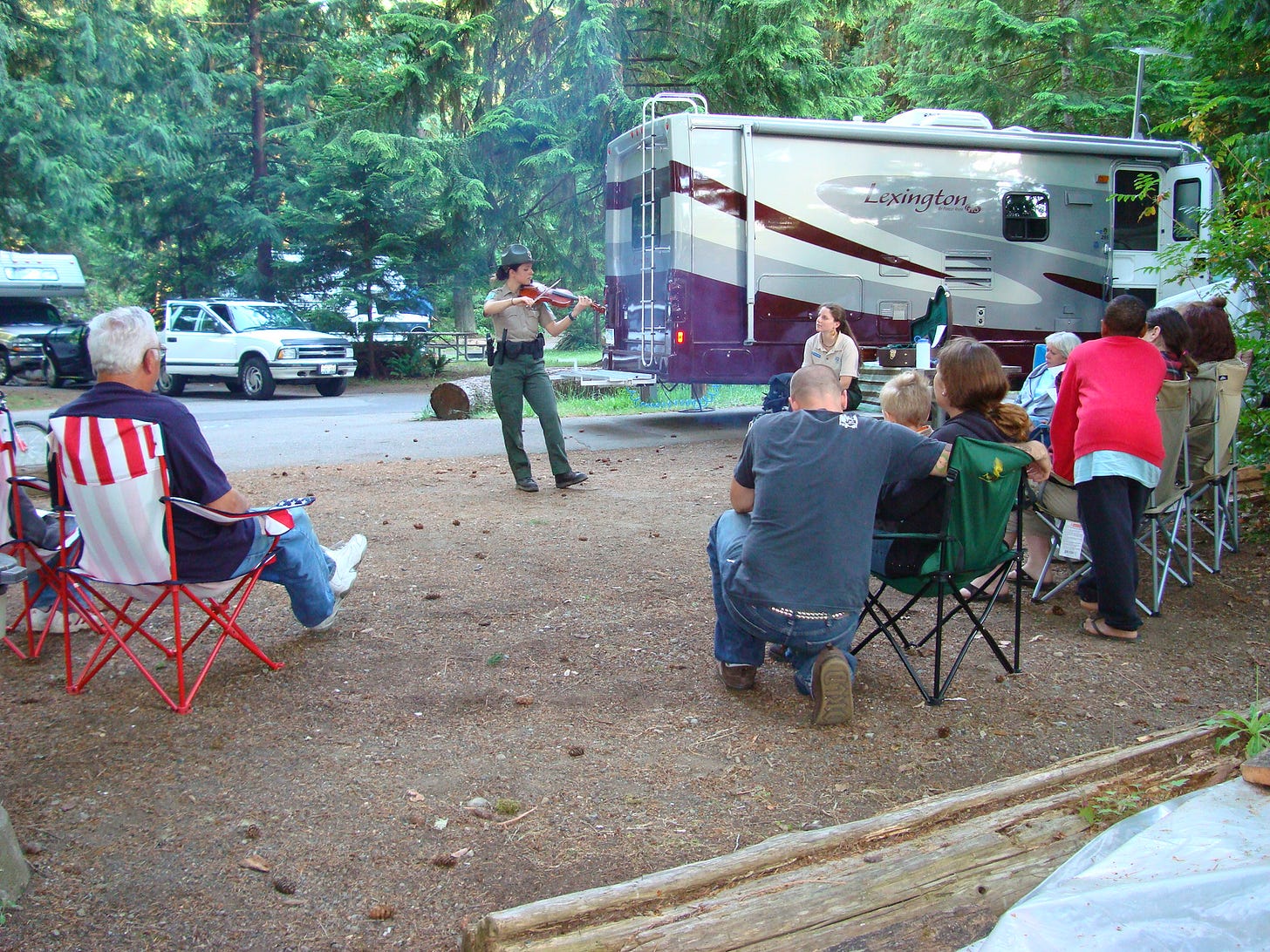

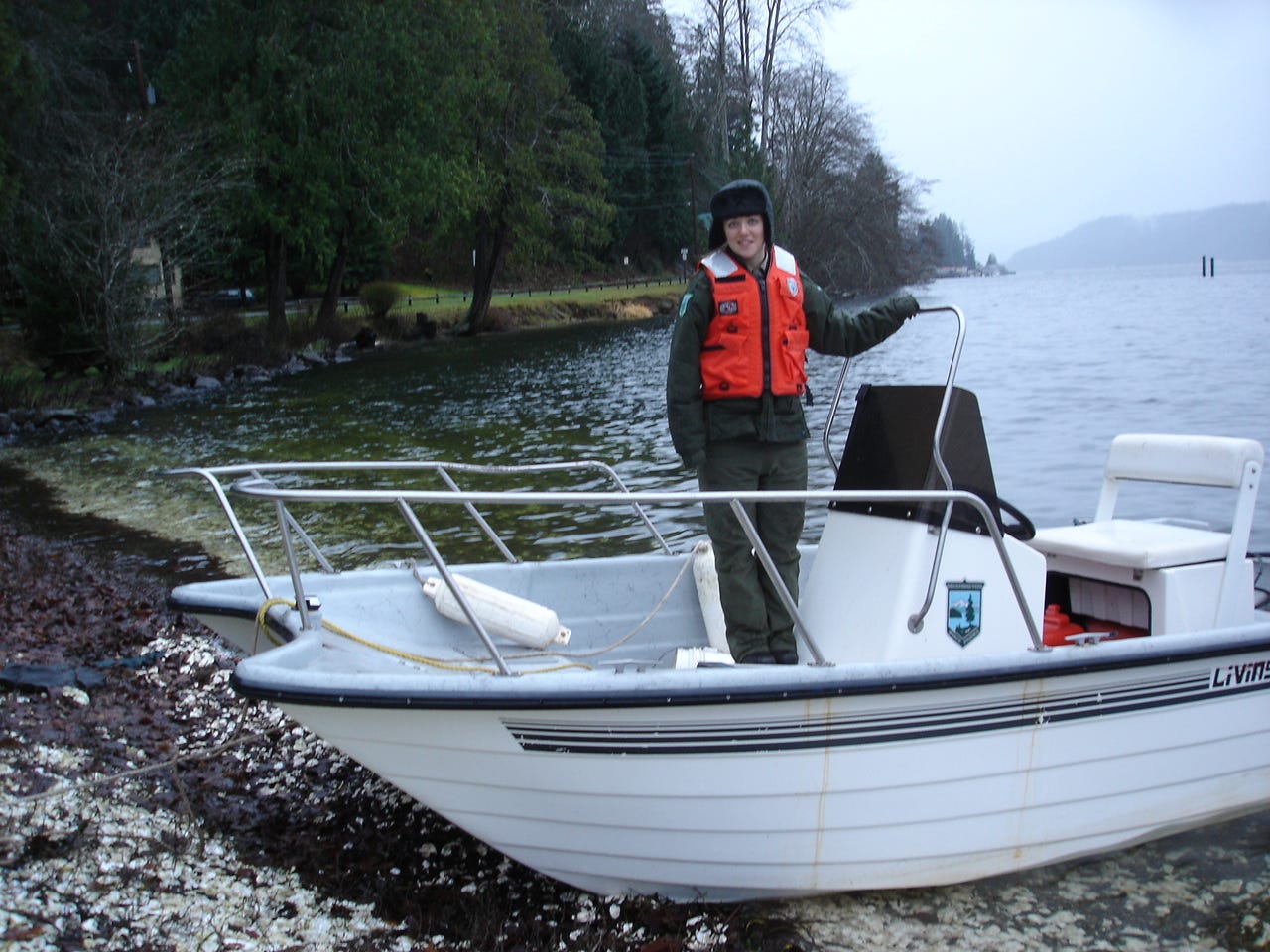
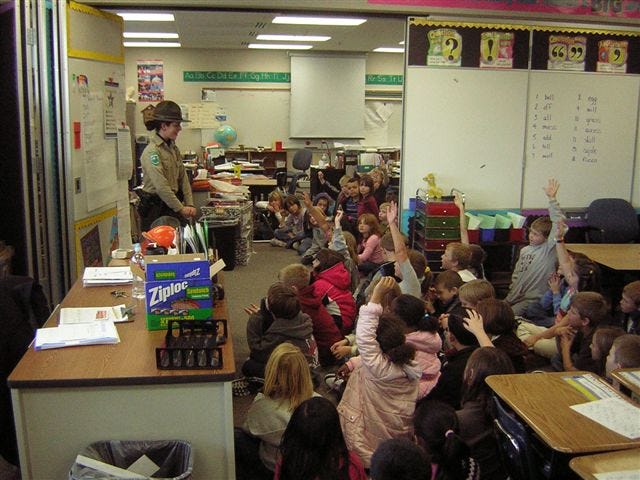
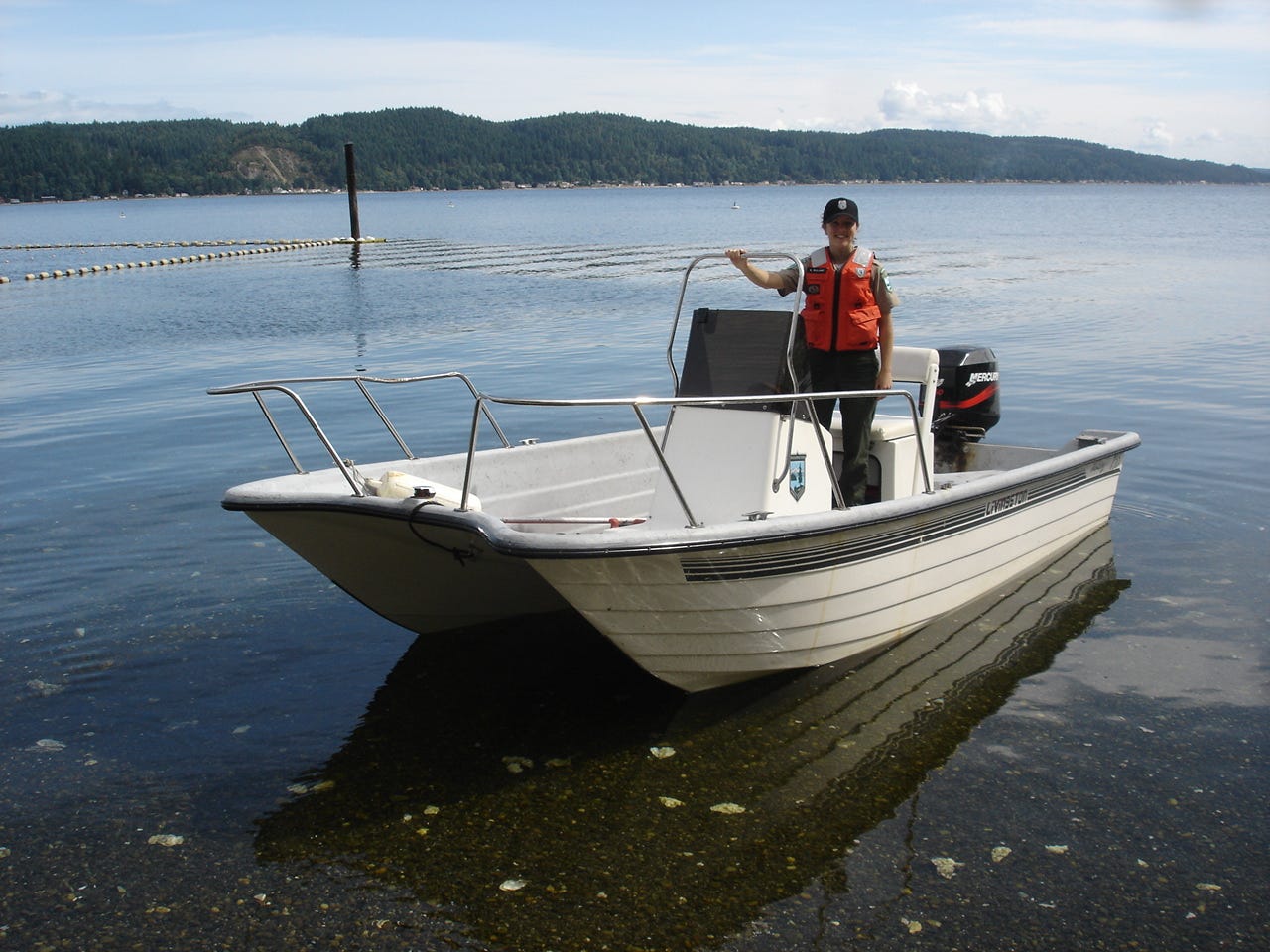

Loved this Anastasia, thanks for sharing. Twanoh would be a great place to be a Ranger! Many years ago I worked for an airline in a reservations center, open only to badged employees. Someone was regularly pooping on the floor in the bathroom, smearing their feces on the walls of the stall. This was someone I worked with! I can only hope that, like the living conditions in someone with hoarding disorder, the behavior must be a symptom of something greater. At least I hope that’s the case rather than shear malice!
These stories were wild! I don't know what it is about a shared toilet that turn some people into total monsters. 🤢